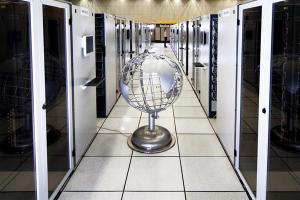Data Analysis Center for the CMS experiment

Current high energy physics experiments such
as CMS aim to explore new territories where new physics is expected, and
where a huge amount of data needs to be collected and analyzed. The
accomplishment of these scientific projects require computing resources
beyond the capabilities of a single user or group, thus the data is
treated under the grid infrastructure according to the Worldwide LHC
Computing Grid [1]. The high energy physics group has a long tradition
in computing. Taking profit from the gained experience, since early 2002
the group contributes to the computing tasks at the CMS experiment. In
2005 IFCA and CIEMAT established the CMS Spanish Tier-2, and since then
provide service to the whole collaboration. A Tier-2 stores sufficient
data and provides adequate computing power for specific physics analysis
tasks. They handle analysis requirements and proportional share of
simulated event production and reconstruction. By March 2012, IFCA
counts with over 2000 CPUs (shared with the GRID-CSIC project) and more
than 2000 terabytes of disk space. Some numbers about the performance
of the IFCA site during 2010: data was transferred at impressive rates,
witnessing peaks of 80 megabytes per second sustained during a day, the
equivalent of one full DVD of data a minute. Around a thousand of
physicists from all around the world run their computing jobs at IFCA,
the site reached peaks of almost 30,000 jobs per day. The site usage is
constantly reported through several CMS tools [2], providing up to date
information about job statuses and accounting information. Continuous
hardware and software upgrades need to be deployed in order to adapt to
the CMS requirements, mainly driven by the amount of data to be produced
and analysed. Permanent monitoring of the site guarantees the high
quality operational status of the site. This allows the early detection
of any eventual issue and the prompt actions to solve them. All those
tasks are carried by experienced Grid and CMS support team at IFCA.
Moreover, the group is deeply involved in the development of tools that
improve the efficiency and friendliness of the analysis user
applications, thus allowing a better use of the resources. [1]
http://lcg.web.cern.ch/LCG/public/tiers.htm[2]
http://dashboard.cern.ch/cms/
